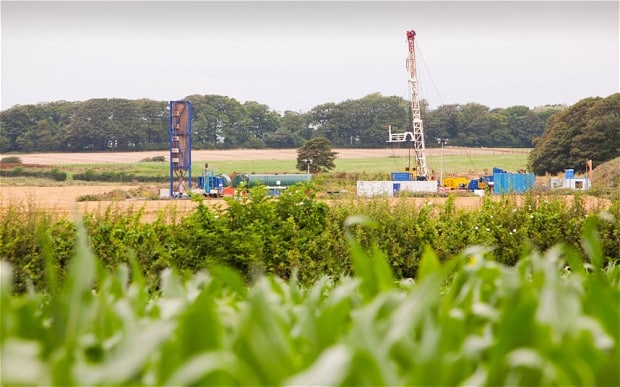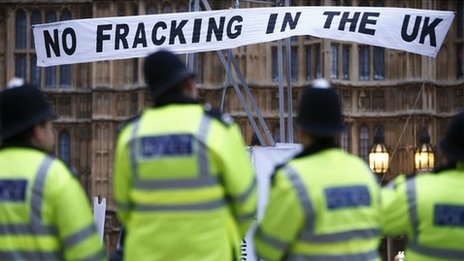The current UK coalition government has overseen the greatest fossil fuel boom since the discovery of North Sea oil, but the controversy that surrounds shale has made it an interesting factor in the run-up to this year’s general election. Here’s what to expect.
More Fracking
The government has shown absolutely no evidence that it is willing to slow down its committed march towards the commercial development of shale gas.
For example, the House of Lords recently approved amendments to the infrastructure bill which, amidst heavy public resistance, will allow fracking companies to extract shale from right underneath people’s homes. This has since been quietly passed onto the House of Commons and gained its first reading on 20 November.
This is irrespective of a wide range of academic reports listing both health and environmental implications, as well as direct human rights inflictions.
Chancellor George Osborne also pledged a further £35 million in the Autumn Statement towards the development of shale gas, with £5 million in particular dedicated to twisting the public’s arm on the matter.
And with the introduction of a Task Force on Shale Gas headed by the ex-environmental minister Lord Chris Smith, the energy industry is very serious in styling a UK fracking boom on America’s recent ‘shale revolution’.
Political instability in Eastern Europe has also contributed to the pro-fracking agenda and has encouraged the government to pursue an easier option over greener, alternative energy sources that may take longer to develop.
Shale has continuously been hyped as a cheap energy source that will define UK energy independence from foreign imports – a view discredited by the government’s own energy researchers.
Environmental Opposition
An increasing amount of communities across the UK have begun organising attempts to resist fracking proposals in their local area.
Talking to DeSmogUK, Hannah Walters from Frack Off UK said: “This is the fastest growing social movement in the UK right now.
“There are currently around 170 anti-fracking community groups actively resisting this industry on a day-by-day basis with several more forming each week.”
“We’re expecting that number to pass 200 as we move into 2015,” Walters predicts.
For example, residents in Fife, Scotland are now urging their council to postpone fracking developments due to worrying reports on health implications and environmental pollution.
Photo: BBC via Creative Commons
However, campaigners are likely to be heavily scrutinised by the police. In December, it was revealed that the police asked Canterbury Christ Church University to hand over a list of members of the public who attended a fracking debate on its campus.
While the university declined the request, it follows similar disclosures that police have been monitoring political activities at campuses around the country, as well as spying on groups that use non-violent methods in their campaigning.
Health Impacts
At the end of last year, a hard-hitting report was commissioned by the Bianca Jagger Human Rights Foundation and delivered to Prime Minister David Cameron. It cites human rights liabilities for the British Government if fracking commences commercially across the UK.
Focusing primarily on the health implications of people living near frack sites, the report called on the government to investigate the impact of fracking on the rights of individuals.
Other reports have also expressed concern regarding the implications on people around fracking sites due to the chemicals involved with hydraulic fracturing.
Talking to the Courier, Dr Richard Dixon, director of Friends of the Earth Scotland, said: “There is a growing body of evidence that environmental and health risks associated with onshore unconventional gas extraction, including coalbed methane, are inherent and impossible to eliminate.”
In a recent damning report by the government’s chief scientific adviser, the author of one of the chapters, Prof Andrew Stirling of the University of Sussex, warned that fracking could carry unforeseen risks that would replicate problems seen with asbestos and thalidomide.
The chapter states: “History presents plenty of examples of innovation trajectories that later proved to be problematic — for instance involving asbestos, benzene, thalidomide, dioxins, lead in petrol, tobacco, many pesticides, mercury, chlorine and endocrine-disrupting compounds.”
Caroline Lucas, MP for the Green Party, when recently writing for the Guardian also lambasted the government’s pursuit of fossil fuels as a “public health imperative”, adding that to save lives, “urgent change is needed”.
Industry Decline
Ed Davey, the energy and climate change secretary has recently expressed his concern regarding a declining fossil fuel industry that needs to adapt to a changing climate and market, stating that the energy industry is “seeing a move from carbon capitalism to climate capitalism”.
“We know with climate change we have got to move out to a low-carbon agenda and we are already seeing the signs that the market is going to be helping to drive this,” he said.
Adaptability and divestment from fossil fuel holdings is a theme expressed by both the secretary and green business institutions, who argue for greater transparency to protect future investors.
They may have been inspired by events in the US where the rapidly grown shale industry has taken a big hit from declining oil prices.
The self titled ‘granddaddy’ of fracking, Harold Hamm, recently lost half of his multi-billion dollar fortune in a shockwave financial crisis that has led to doubts regarding shale as the saviour of US energy politics.
Photo: Alamy via Creative Commons
Subscribe to our newsletter
Stay up to date with DeSmog news and alerts







